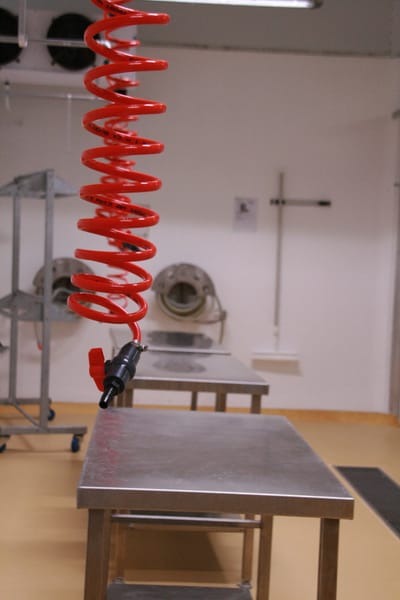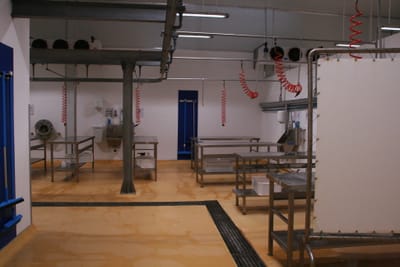OPÉRATIONS D'ABATTOIR



LE CROC ABATTOIR
Le Croc’s crocodile abattoir is registered and licensed under 3/01G for local market and ZA 384 for meat exports. Crocodile meat is sold both locally and internationally, strictly adhering to local and international meat safety and export regulations.
Abattoir Export Permit
Abattoir Local Permit
Crocodiles are humanely slaughtered under close supervision of independent meat inspector and animal welfare officer to ensure compliance with local and international guidelines on procedures and methods described for humane slaughter and animal welfare practices (see World Organisation for Animal Health (OIE), ICFA guidelines and EU regulations) .
MEAT SAFETY: LAW & STANDARDS
Crocodile meat production is regulated under the South African Meat Safety Act (Act 40 of 2000). Specific regulations and Veterinary procedural Notices (VPN) for the slaughter of crocodiles and the processing of crocodile meat has been developed and implemented, ensuring that strict meat safety standards are maintained at local abattoirs. In addition, thereto, the South African Bureau of Standards (SABS) standards (SANS 10049 for Food Safety Management, and SANS 10330 for a Hazard Analysis and Critical Control Points System) serves as guidelines for the operation of domestic abattoirs and meat processing plants. Export of crocodile meat is required to comply with the import country requirements. Import requirements for crocodile meat products have been harmonized under European law, and the South African veterinary authorities require that export abattoirs comply with the applicable EU regulations.
Le Croc’s crocodile abattoir is registered and licensed under 3/01G for local market and ZA 384 for meat exports. Crocodile meat is sold both locally and internationally, strictly adhering to local and international meat safety and export regulations.
Abattoir Export Permit
Abattoir Local Permit
Crocodiles are humanely slaughtered under close supervision of independent meat inspector and animal welfare officer to ensure compliance with local and international guidelines on procedures and methods described for humane slaughter and animal welfare practices (see World Organisation for Animal Health (OIE), ICFA guidelines and EU regulations) .
MEAT SAFETY: LAW & STANDARDS
Crocodile meat production is regulated under the South African Meat Safety Act (Act 40 of 2000). Specific regulations and Veterinary procedural Notices (VPN) for the slaughter of crocodiles and the processing of crocodile meat has been developed and implemented, ensuring that strict meat safety standards are maintained at local abattoirs. In addition, thereto, the South African Bureau of Standards (SABS) standards (SANS 10049 for Food Safety Management, and SANS 10330 for a Hazard Analysis and Critical Control Points System) serves as guidelines for the operation of domestic abattoirs and meat processing plants. Export of crocodile meat is required to comply with the import country requirements. Import requirements for crocodile meat products have been harmonized under European law, and the South African veterinary authorities require that export abattoirs comply with the applicable EU regulations.


